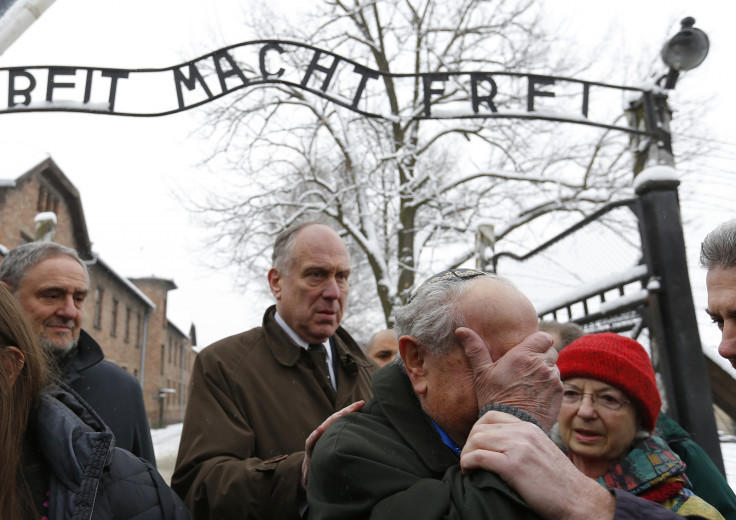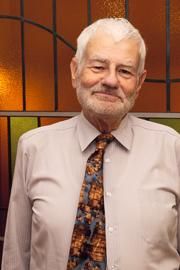Holocaust Memorial Day: 'We must remember' - Jewish refugee who fled Nazis tells his story

As European leaders marked the anniversary of the liberation of the Auschwitz extermination camp in Poland, Bernd Koschland was getting ready to take part in a local ceremony close to his North London home.
It was also his 84<sup>th birthday, an annual coincidence that meant he could never forget about the Holocaust Memorial Day, he quipped in a telephone interview.
The youngster was sent from Nazi Germany to the UK by his parents, who realised the direction that Hitler was taking the country and that it was no longer safe for their children.
Koschland's razor sharp wit is matched by his memory as he recounts the year he fled Nazi Germany for Britain.
"We left my father and sister behind, my mother travelled up with me to Hamburg. I arrived in Southampton on board an American liner together with about 30 children of varying ages," he told IBTimes UK.
"From there I was taken to Margate in Kent to a hostel. I had to learn English and adapt to a new way of life. I was only eight years old at the time."

Koschland arrived in Britain in March 1939 as part of the Kindertransport mission, a series of informal rescue efforts that cumulatively transported 10,000 children from Nazi territory to the UK.
His sister also made it to the UK as part of the scheme, but the children would never see their parents again. They met their deaths in either Riga or Izbica in 1942.
Despite the seismic upheaval in his life circumstances, Koschland said he managed to adapt to life outside of Germany and made trips to the local cinema in the English seaside town.
"I was thrown together with other boys and was the youngest in all of that crew. I suppose I fitted in and made friends and began to learn something of England and English ways.
"I went, for the first time in my life, to the cinema in Margate to see the Wizard of Oz. That was something new for me."
Koschland went on to live with foster parents in the UK and after undertaking training to be a rabbi, embarked on a career as a secondary school teacher.
Holocaust education key for a safer world
"I know they say you learn from history – you don't actually - but one has to be aware of what has happened," Koschland muses with nuanced optimism.
From Iraqi Kuridstan, to Rwanda, to the Balkans, the twentieth century is scarred with examples that humanity has not learned from the history of the Holocaust.
Yet Koschland remains committed through his extensive community work, he regularly gives talks about his experiences in schools, to speaking about the Holocaust in the hope that his memories are passed on to the next generation.
"One can do a little bit by talking about the events, and try to impress your audience not just with what happened, as a story of someone's personal life, but to look at the future, that there's a role to play to make the world a better place."
Rising tide of anti-Semitism and the need for tolerance
This year's anniversary, marking 70 years since Auschwitz was liberated by Red Army forces, has coincided with a rising tide of anti-Semitism in parts of Europe.
Four Jewish people were killed by a gun man who stormed a kosher supermarket in Paris earlier this month, in an attack related to the rampage that left 12 people dead at the satirical magazine Charlie Hebdo two days earlier.
Koschland said that the anti-Semitic attack and the current wave of anti-Semitism in Europe troubled him but warned that the attacks showed the need for more tolerance in society.
"I worry to some extent, but unfortunately I'm an optmist," he told IBTimes UK. "The events in France were really horrendous obviously. The intolerance by certain sections, a small minority of people, of what others do and think and speak and say."
"Tolerance is one of the things that has to come through. The idea that we're allowed to think differently, speak differently, be different.
"I know it sounds naïve but it's something that I've tried to work for in my local borough. With anti-Semitism, it's something that has peaked. Like the FTSE goes up, it's something that will go down again and settle down.
"There may be an underlying anti-Semitism in France but it will become more quiet and life will go on as before. I hope that's the case, otherwise life would be difficult."
'We must do more' to assist refugees today
The Kindertransport programme was initiated in the wake of Kristallnacht, the infamous night in November 1938 when the Nazi leadership ordered the destruction of Jewish property and businesses in Germany and other countries they controlled.
A group of British Jewish and Quaker leaders appealed to British Prime Minister Neville Chamberlain that the country opened its borders temporarily to a number of unaccompanied Jewish children.
Koschland feels a deep gratitude to the people who helped him continue with his life after he arrived in Britain 76 years ago as an eight-year old refugee. Yet, looking at contemporary refugee crises, he believes that the UK has not shown much compassion toward those fleeing persecution in Syria and Iraq.
"It is a problem. I think we need to be more compassionate to the refugees fleeing...we must look after the refugees as best we can. We've been through that situation once before, in fact several times before."
Some 3.8 million Syrians have fled their home country since 2011, according to human rights watchdog Amnesty International: 97% of these people are living in neighbouring countries, the group said, while only a few dozen of the most vulnerable cases have been accepted by the UK.
"I feel very strongly for them, very strongly that we need to do more for them. Allowing in 200 or so in, it's not even a drop in a bucket of water, much more could be done."
Findmypast.co.uk has launched a special Kindertransport project that gives access to thousands of records on the children that fled Germany to Britain.
© Copyright IBTimes 2025. All rights reserved.






















